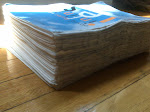
In the previous post I referred to "getting trained for glory". I was talking about my daughter starting on tennis lessons at the nearby club on the Beach with me now happily taking the position of the observer, instead of being the one pursuing glory.
Well it seems that even in observing and writing, one can pursue glory.
Yesterday there was an interesting piece in the New York Times by David Brooks entitled, "Genius: The Modern View".
Brooks makes the case that genius, instead of miraculously appearing in people like Mozart, is the result of hard work and controllable factors:
"The latest research suggests a more prosaic, democratic, even puritanical view of the world. The key factor separating geniuses from the merely accomplished is not a divine spark. It’s not I.Q., a generally bad predictor of success, even in realms like chess. Instead, it’s deliberate practice. Top performers spend more hours (many more hours) rigorously practicing their craft."
Brooks applies this theory to the creation of a hypothetical genius writer:
"If you wanted to picture how a typical genius might develop, you’d take a girl who possessed a slightly above average verbal ability. It wouldn’t have to be a big talent, just enough so that she might gain some sense of distinction. Then you would want her to meet, say, a novelist, who coincidentally shared some similar biographical traits. Maybe the writer was from the same town, had the same ethnic background, or, shared the same birthday — anything to create a sense of affinity.
"This contact would give the girl a vision of her future self. It would, Coyle emphasizes, give her a glimpse of an enchanted circle she might someday join. It would also help if one of her parents died when she was 12, infusing her with a profound sense of insecurity and fueling a desperate need for success.
"Armed with this ambition, she would read novels and literary biographies without end. This would give her a core knowledge of her field. She’d be able to chunk Victorian novelists into one group, Magical Realists in another group and Renaissance poets into another. This ability to place information into patterns, or chunks, vastly improves memory skills. She’d be able to see new writing in deeper ways and quickly perceive its inner workings.
"Then she would practice writing. Her practice would be slow, painstaking and error-focused. According to Colvin, Ben Franklin would take essays from The Spectator magazine and translate them into verse. Then he’d translate his verse back into prose and examine, sentence by sentence, where his essay was inferior to The Spectator’s original." (Source)
When I read this I wondered if this was somehow how David Foster Wallace was built.
Also when I hear Brooks talk about the plasticity of the brain...
"This research takes some of the magic out of great achievement. But it underlines a fact that is often neglected. Public discussion is smitten by genetics and what we’re “hard-wired” to do. And it’s true that genes place a leash on our capacities. But the brain is also phenomenally plastic. We construct ourselves through behavior. As Coyle observes, it’s not who you are, it’s what you do."
...I wonder again if it was the writing and the genius that came before the depression and suicidality and not the other way around.
You are what you do? Hmm.
So interesting that in turns out that David Foster Wallace apparently wore his famous bandana because he often felt like his head was going to explode (see Rolling Stone). Was it always like that for him? When did it begin? When he was a star football player? A rising tennis star? Or when he became a genius writer?


No comments:
Post a Comment
Surely You Jest...